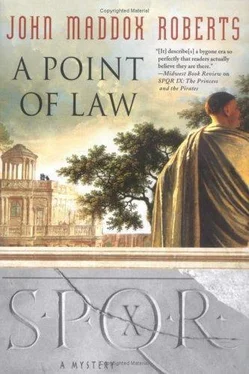John Roberts - A Point of Law
Здесь есть возможность читать онлайн «John Roberts - A Point of Law» весь текст электронной книги совершенно бесплатно (целиком полную версию без сокращений). В некоторых случаях можно слушать аудио, скачать через торрент в формате fb2 и присутствует краткое содержание. Год выпуска: 0101, ISBN: 0101, Издательство: St. Martin, Жанр: Исторический детектив, на английском языке. Описание произведения, (предисловие) а так же отзывы посетителей доступны на портале библиотеки ЛибКат.
- Название:A Point of Law
- Автор:
- Издательство:St. Martin
- Жанр:
- Год:0101
- ISBN:9780312337254
- Рейтинг книги:5 / 5. Голосов: 1
-
Избранное:Добавить в избранное
- Отзывы:
-
Ваша оценка:
- 100
- 1
- 2
- 3
- 4
- 5
A Point of Law: краткое содержание, описание и аннотация
Предлагаем к чтению аннотацию, описание, краткое содержание или предисловие (зависит от того, что написал сам автор книги «A Point of Law»). Если вы не нашли необходимую информацию о книге — напишите в комментариях, мы постараемся отыскать её.
A Point of Law — читать онлайн бесплатно полную книгу (весь текст) целиком
Ниже представлен текст книги, разбитый по страницам. Система сохранения места последней прочитанной страницы, позволяет с удобством читать онлайн бесплатно книгу «A Point of Law», без необходимости каждый раз заново искать на чём Вы остановились. Поставьте закладку, и сможете в любой момент перейти на страницу, на которой закончили чтение.
Интервал:
Закладка:
“It isn’t necessary that it be a famous work,” Callista said. “Merely that each correspondent have a copy, and the copies must be identical-no copyist’s errors, and ideally each line of each column should begin with exactly the same word. Sometimes a letter substitution involves counting inward from the first character in a specific line.”
She had lost me again. “Then the books would almost have to come from the same copyist.”
“That would be best. What sort of book was it?”
“It was a textbook of court speeches. They’re standard teaching tools for the rhetoric schools that specialize in teaching lawyers. They use famous legal speeches, or sometimes hypothetical speeches appropriate for hypothetical cases, to demonstrate how to build logical arguments for or against particular positions. This one seemed to be about points of law-the sort of legal hairsplitting that keeps expert pleaders in demand.”
“Law is not a specialty of mine,” she said. “Is there a standard text for these things?”
“No, but I happen to know who trained the man in question: Aulus Sulpicius Galba, now duumvir of Baiae.”
“And has this man written such a text?” Callista asked. “Almost any book can be used for encoding, and it would make sense for a man to use the work most familiar to him.”
“Almost certainly, since he is a law teacher. I could probably find a copy. I might even be able to get the original that I saw yesterday.”
“Decius,” Julia said, “you will do nothing of the sort. You are far too old for burglary. Send Hermes to steal it.”
Callista was looking from one to the other of us as if we were specimens of some exotic beast she was studying. Julia caught her look. “It is quite all right,” she assured the woman. “The man is dead.”
“Of course it might not be the key,” Callista said, “but it seems to be a good candidate for the job, and I have little hope of making a quick translation without it.”
“Then I’ll get it for you,” I said. I turned around. “Where’s Hermes?”
“If I know him,” Julia said, “he’s wherever the best-looking women in this house are kept.”
“But that’s right in this courtyard,” Hermes said gallantly. He was standing just within a doorway that led to a dining room. He had, however, been chatting up a pretty slave girl.
“Curb your insolence,” Julia said. “Can you go find us that book without being seen?”
He thought a moment, going over the urban terrain. “I’ll bribe my way into one of the houses that opens on another street, then cross the common courtyard. If there’s nobody in the house and the book is still there, I’ll get it.”
“Then go and come back here as quickly as you can-no stopping on the way, mind.”
“I shall be as my namesake,” he said, hurrying from the poolside as swiftly and silently as a leopard.
“He seems to be a versatile lad,” Callista noted with some approval.
“Every politician needs one,” I told her.
While we waited for Hermes to return with his loot, we fell to discussing my situation. I told them of my conversation with Cato, about the confusion of marriages and planned marriages that decorated the recent past.
“I know Octavia and her brother only slightly,” Julia admitted, referring to the wife of Caius Marcellus. “Caesar’s sister, another Julia, married Atius Balbus and their daughter, Atia, married Caius Octavius. The younger Caius Octavius and Octavia are their children. The elder Octavius died some time back. Atia is now married to Lucius Philippus, I believe.”
“I know their father,” I said. “A few years ago, when Octavius was praetor, Clodius and I brawled our way right into his court. I’d have cut his throat right there in public if the lictors hadn’t separated us.”
“Just as well you didn’t succeed,” Julia observed. “I heard there was a Vestal present in the court that day.”
“Right,” I said. “They’d probably have hurled me off the Tarpeian Rock or tied me in a weighted sack and tossed me off the Sublician Bridge.”
“You Romans have such imaginative punishments,” Callista said.
“That’s nothing,” I told her. “You ought to see what we do to parricides or arsonists.”
“And yet you are not under arrest even though you are charged with murder.”
“We Romans,” Julia told her, “have a robust sense of justice. We reserve our harshest punishments for crimes that endanger the whole community. Rome is a firetrap so arson is the most serious of crimes. Treason endangers us all. Sacrilege, parricide, and incest anger the gods and draw the wrath of the immortals upon the whole City.”
“Exactly,” I put in. “But a grown citizen is expected to be able to take care of himself. If someone tries to kill you, you should kill him first. You’re a poor prospect for the legions if you’re unable to defend yourself.”
“There are exceptions,” Julia pointed out. “Murder by subterfuge, especially if poison or magic are involved, are not tolerated. Likewise, violence toward sacrosanct personages, such as Tribunes of the People or Vestals, draws harsh punishment.”
“Ordinary senators, on the other hand,” I said, “get no such consideration. In really rough times, I’ve seen as many as half a dozen senators carried dead out of alleys. There are always plenty more where they came from. The Curia is too crowded as it is.”
“I see. And these political marriages of yours: Just what is the point of them since they are so easily dissolved?”
“They’re traditional,” I told her. “They hark back to a day when divorce was much more difficult. At one time only patricians had full citizenship, and they had a special form of marriage- conferratio -that was indissoluble. In those days a political marriage genuinely bound the two families.”
“We Roman women of the great families put up with a great deal from our men,” Julia said. “It is bad enough being pawns in a political game, but it would be nice if we were at least pawns that counted for something.”
“Between your multiple marriages and divorces, and your habit of adopting each other’s sons, I’m surprised you bother with these family names at all. They can hardly have much meaning by this time.”
“It is odd, isn’t it?” I agreed. “Yet we still behave as if our names were of utmost significance.”
“I suspect,” Julia put in, “that is because adoption takes place only among a limited number of families, ones that have traditional relationships and a good deal of shared blood.”
“That’s true,” I said. “Metellus Scipio, for instance, is the last of the Cornelia Scipiones, but he is a Metellus on his mother’s side, so he’s a cousin with or without the name.”
“I find it all very confusing,” Callista said.
“Be happy that you don’t have to worry about such things,” Julia advised her.
“Greek women have been known to seek revenge when treated in such a fashion. We remember Medea.”
“Upper class Roman wives are usually ready for a change of husbands after a year or two.” I saw Julia glowering at me. “There are exceptions, of course.”
For another hour or so Julia and Callista talked of philosophical subjects upon which I wisely declined to intrude, save to make occasional noncommittal noises, as if I were following their discussion intently. To my great amazement, Julia seemed to genuinely like the Alexandrian woman. Of course, she had come calling that morning to see what sort of woman I was visiting. She must have been surprised to find a kindred spirit instead of some foreign temptress. Not that Callista wouldn’t have made a fine foreign temptress had she chosen to adopt that role.
Читать дальшеИнтервал:
Закладка:
Похожие книги на «A Point of Law»
Представляем Вашему вниманию похожие книги на «A Point of Law» списком для выбора. Мы отобрали схожую по названию и смыслу литературу в надежде предоставить читателям больше вариантов отыскать новые, интересные, ещё непрочитанные произведения.
Обсуждение, отзывы о книге «A Point of Law» и просто собственные мнения читателей. Оставьте ваши комментарии, напишите, что Вы думаете о произведении, его смысле или главных героях. Укажите что конкретно понравилось, а что нет, и почему Вы так считаете.









